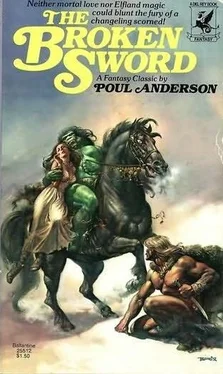Poul Anderson - The Broken Sword
Здесь есть возможность читать онлайн «Poul Anderson - The Broken Sword» весь текст электронной книги совершенно бесплатно (целиком полную версию без сокращений). В некоторых случаях можно слушать аудио, скачать через торрент в формате fb2 и присутствует краткое содержание. Жанр: Фэнтези, на английском языке. Описание произведения, (предисловие) а так же отзывы посетителей доступны на портале библиотеки ЛибКат.
- Название:The Broken Sword
- Автор:
- Жанр:
- Год:неизвестен
- ISBN:нет данных
- Рейтинг книги:3 / 5. Голосов: 1
-
Избранное:Добавить в избранное
- Отзывы:
-
Ваша оценка:
- 60
- 1
- 2
- 3
- 4
- 5
The Broken Sword: краткое содержание, описание и аннотация
Предлагаем к чтению аннотацию, описание, краткое содержание или предисловие (зависит от того, что написал сам автор книги «The Broken Sword»). Если вы не нашли необходимую информацию о книге — напишите в комментариях, мы постараемся отыскать её.
The Broken Sword — читать онлайн бесплатно полную книгу (весь текст) целиком
Ниже представлен текст книги, разбитый по страницам. Система сохранения места последней прочитанной страницы, позволяет с удобством читать онлайн бесплатно книгу «The Broken Sword», без необходимости каждый раз заново искать на чём Вы остановились. Поставьте закладку, и сможете в любой момент перейти на страницу, на которой закончили чтение.
Интервал:
Закладка:
They saw somewhat of humans, but paid no great heed, their interest being in Faerie. Mortal men never spied them save in frightened glimpses. Not everywhere did they war; most realms guested them well and were eager to trade goods, which made for long stopovers. Three years after they set out, the ships returned with a huge load of wealth and captives. It had been a glorious voyage, of which great report went about in Alfheim and the neighbouring lands; and the fame of Imric and Skafloc stood high.
VI
The witch dwelt alone in the woods with only her memories for daily company, and over the years these fed on her soul and left their castings of hatred and vengeance—lust. By trying this and that she learned how to increase her powers a little, until she was raising spirits out of the earth and speaking with demons of the upper air; and they taught her more. To the Black Sabbath on the Brocken she rode, high through the sky on a broomstick with her rags astream in the wind. A monster feasting it was, where ancient hideous shapes chanted about the dark altar and drank deep from kettles of blood; but perhaps the worst of all were the young women who joined in the rites and the dreadful matings.
Wiser the witch returned, with a rat for familiar who took blood out of her withered breasts with his sharp little teeth and at night crouched on her pillow and cluttered in her ear as she slept. And so at last she thought she had strength to raise the one whom she had longed for.
Thunder and lightning rolled about her hovel, blue glare and the stink of hell’s pits. But the shadowy presence before which she grovelled was beautiful in its way, as all sin appears beautiful to the willing sinner.
“O you of the many names, Prince of Darkness, Evil Companion,” cried the witch, “I would that you grant my wish, and for that I will pay your old price.”
He whom she had called spoke, and his voice was slow and soft and patient: “Already you have gone far down my road, but you have not altogether become mine. The mercy from above is infinite, and only if you yourself reject it can you be lost.”
“What care I for mercy?” asked the witch. “It will not avenge my sons. I stand ready to give my soul unto you if you will deliver my enemies into my hands.”
“That I may not do,” said her guest, “but I may give you the means to entrap them if your cunning be greater than theirs.”
“That will be enough.”
“But bethink you, have you not had revenge on Orm already? ’Tis your work that he has a changeling for eldest son, and the ill that that being will wreak on him can be great.”
“Yet Orm’s true son prospers in Alfheim, and his other children grow apace. I would wipe out his foul seed to the last of the lot, even as he wiped out mine. The heathen gods will not help me, nor surely will He whose name I had best not speak. Therefore you, Black Majesty, must be my friend.”
A gaze wherein were little flickering flames more cold than winter brooded long on her. “The gods are not out of this matter,” said the quiet, rustling voice, “as you may have heard. Odin, who foresees what dooms are laid on men, makes schemes that are long in the weaving ... But you shall have my help. Power and knowledge will I give you, until you become a mighty witch. And I will tell you how to strike, by a way which is sure unless your enemies are wiser than you think. “There are three Powers in the world which not gods nor demons nor men can stay, against which no magic shall prevail and no might shall stand, and they are the White Christ, Time, and Love.
“From the first you may await only thwarting of your desire, and you must be careful that He and His in no way enter the struggle. This you can do by remembering that Heaven leaves lesser beings their free will, and thus does not force them into its own ways; even the miracles have done no more than leave open a possibility to men.
“The second, which has more names than I myself—Fate, Destiny, Law, Wyrd, the Norns, Necessity, Brahm, and others beyond counting—is not to be appealed to, for it does not hear. Nor can you hope to understand how it exists together with the freedom whereof I spoke, any more than you can understand how there are both old gods and new. But for the wreaking of the greatest spells, you must ponder on this until you know in your inmost being that truth is a thing which bears as many shapes as there are minds which strive to see it.
“And the third of the Powers is a mortal thing, therefore it can harm as well as help, and this is the one you must use.”
Now the witch swore a certain oath, and was told where and how to drink the knowledge she needed, and there the council ended.
Save for this: that as her caller left the hut, she peered after him, and what she saw departing was not what she had seen within. Rather the shape was of a very tall man, who strode swiftly albeit his beard was long and wolf-grey. He was wrapped in a cloak and carried a spear, and beneath his wide-brimmed hat it seemed that he had but a single eye. She remembered who also was cunning, and often crooked of purpose, and given to disguise in his wanderings to and fro upon the earth; and a shiver went through her.
But then he was gone—and she had not really seen him clear—it could have been a trick of the starlight—she would not brood on such uneasy questions, but only on her loss and her coming revenge.
Save that the changeling was fierce and noisy, he could not be told from the true babe, and though Ailfrida puzzled over her little son’s ways she had no thought it was not him at all. She christened the child Valgard as Orm wished, and sang to him. and played with him and was gladdened. But he bit so hard that it was pain to nurse him. Orm was delighted when he came home and saw such a fine strong boy. “A great warrior will he be,” cried the chief, “a swinger of weapons and a rider of ships and horses.” He looked about the yard. “But where are the dogs? Where is my trusty old Gram?”
“Gram is dead,” said Ailfrida tonelessly. “He sought to leap on Valgard and rend him, so I had the poor mad beast slain. But it must have given notions to the other dogs, who growl and slink away when I carry the child outside.”
“That is strange,” said Orm, “for my folk have ever been good with hounds and horses.”
But as Valgard grew it became plain that no beast liked to have him around; cattle ran off, horses snorted and shied, cats spat and climbed a tree, and the boy must early learn the use of a spear to ward himself against dogs. He in return was no friend to animals, but dealt kicks and curses, and became a relentless hunter.
He was sullen and close-mouthed, given to wild tricks and refusal of obedience. The thralls hated him for his ill will and the cruel jests he played on them. And slowly, fighting it the whole way, Ailfrida came to have no love for him.
But Orm was fond of Valgard even if they did not always agree. When he had to strike the boy, he could draw no cry of pain however hard his hand fell. And when he had sword-drill and his blade whined down as if to split the skull, Valgard never blinked. He grew up strong and swift, taking to weapons as if born with them, and showed no fear or softness whatever happened. He had no real friends, but they were not few who followed him.
Orm had more children by Ailfrida—two sons, red-haired Ketil and dark Asmund, who were both promising boys, and daughters Asgerd and Freda, of whom the last was nigh an image of her mother. These were like other youngsters, glad and sad by turns, playing about their mother and then later rambling over the whole land, and Ailfrida loved them with an abiding and aching love. Orm liked them too, but Valgard was his darling.
Strange, aloof, silent, Valgard neared his manhood. He was outwardly no different from Skafloc, save maybe that his hair was a shade darker and his skin whiter and that there was a flat hard shallowness to his eyes. But his mouth was sullen, he seldom smiled except when he drew blood or otherwise gave pain, and then it was a mere skinning of teeth. Taller and stronger than most boys of his age, he had small use for them aside from leading them in gangs to work mischief. He would rarely help with the farm unless it was butchering season, but instead went on long lonely walks.
Читать дальшеИнтервал:
Закладка:
Похожие книги на «The Broken Sword»
Представляем Вашему вниманию похожие книги на «The Broken Sword» списком для выбора. Мы отобрали схожую по названию и смыслу литературу в надежде предоставить читателям больше вариантов отыскать новые, интересные, ещё непрочитанные произведения.
Обсуждение, отзывы о книге «The Broken Sword» и просто собственные мнения читателей. Оставьте ваши комментарии, напишите, что Вы думаете о произведении, его смысле или главных героях. Укажите что конкретно понравилось, а что нет, и почему Вы так считаете.











